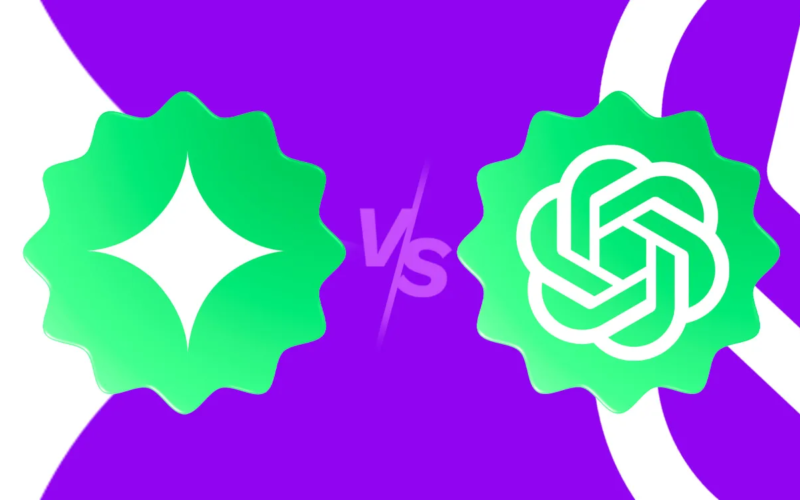OpenAI and Google are in a tight race to deliver the most capable Deep Research agent. While Google’s agent runs on the Gemini 2.0 Flash Thinking model, OpenAI’s version is powered by a fine-tuned variant of the o3 model. What’s particularly noteworthy is that Google offers its Deep Research tool for free, whereas OpenAI places it behind a $20/month paywall. That said, we put both AI agents through a series of tests to see how they perform let’s dive into the comparison.
Task #1: Research on China’s Emergence in AI
To evaluate the Deep Research agents in ChatGPT and Gemini, I asked both to conduct an in-depth analysis of China’s rise in the AI sector. The task included examining leading AI companies in China, government policies, and the ongoing competition with U.S. research labs.
ChatGPT’s Deep Research agent took around 10 minutes to complete the task, citing 30 sources and producing a detailed 9,000-word report. In contrast, Gemini’s Deep Research agent completed the task in 8 minutes and generated a more concise 3,000-word report but impressively, it analyzed data from over 170 websites, showcasing its broad web-scanning capability.
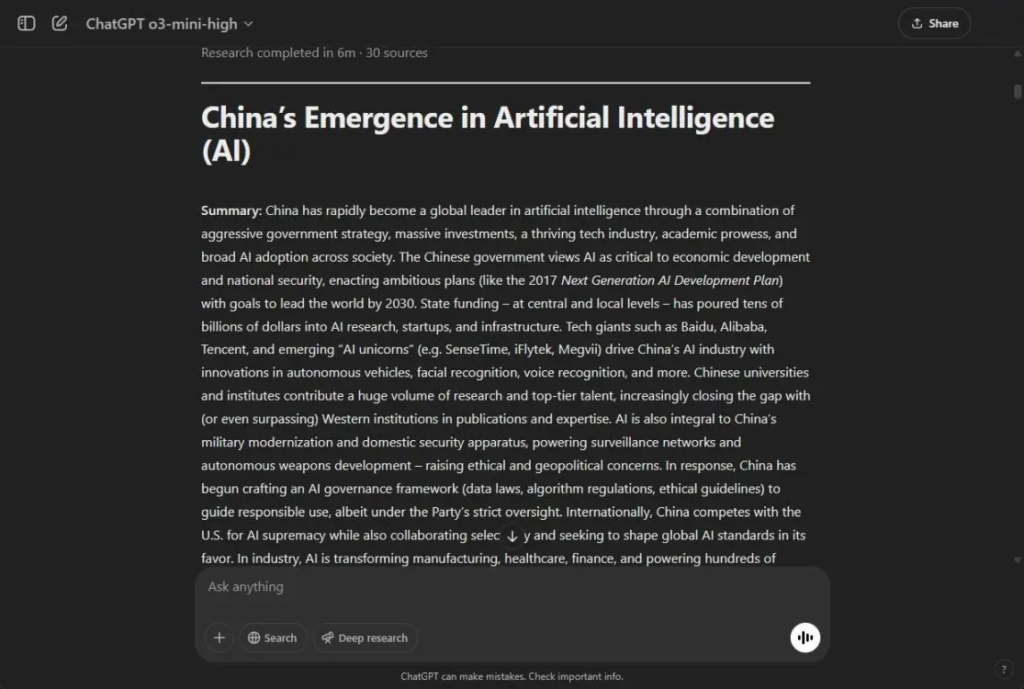
When it came to the research output, I thoroughly reviewed both reports and noticed that ChatGPT’s Deep Research agent completely missed recent AI developments in China. It failed to mention key advancements like DeepSeek R1 and Baidu’s new Ernie 4.5 model, among others.
Digging deeper, it became clear that ChatGPT’s agent leaned heavily on outdated sources, including a Stanford article from 2017 and a Wikipedia entry last updated in 2021. Because of this, much of the information in the report was no longer relevant, and it didn’t cover newer breakthroughs in video generation models or China’s growing robotics sector.
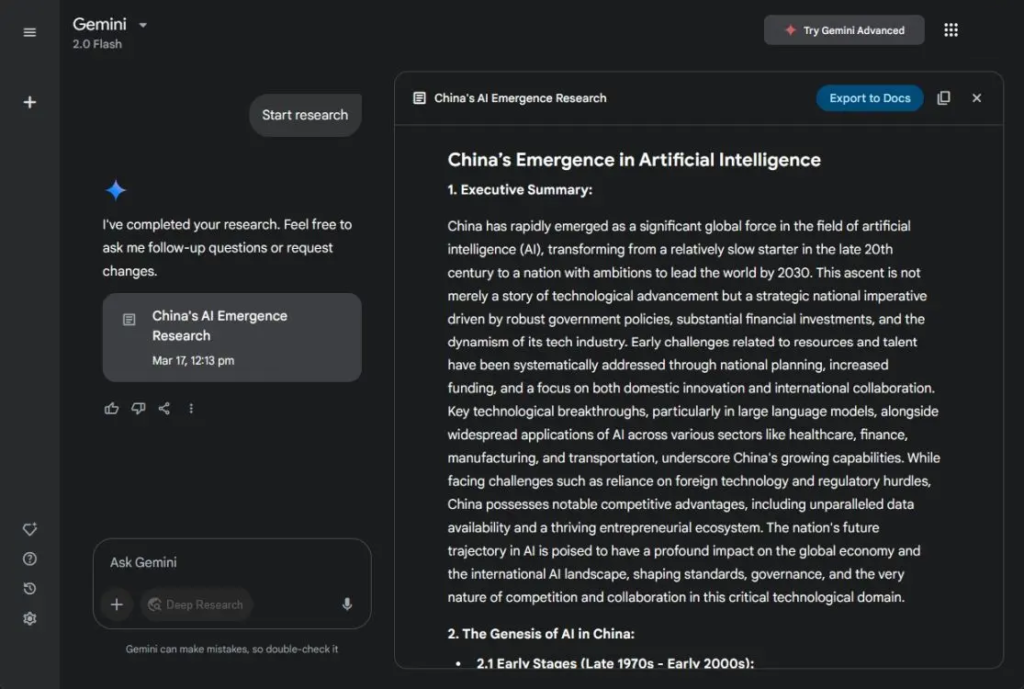
Gemini’s Deep Research agent, though more concise, delivered far more current insights. It noted, “Notably, DeepSeek, a startup established in 2023, has quickly risen to prominence with its R1 model.” It also highlighted DeepSeek’s innovation, stating, “DeepSeek has also distinguished itself through its pioneering work in developing novel architectural advancements, such as Multi-Head Latent Attention (MLA).”
Gemini’s Deep Research agent also covered cutting-edge topics like video generation AI tools mentioning Kling AI and MiniMax as well as AI-powered robotics companies such as Unitree. In my view, Gemini’s clear advantage lies in its direct access to Google’s constantly updated search index, which pulls in fresh content from across the web. On the other hand, OpenAI seems to be leveraging Bing for web curation, which may explain why its research results often include outdated information.
Task #2: Research on The Future of AI Chips over Nvidia GPUs
For the next test, I asked both ChatGPT and Gemini’s Deep Research agents to explore the future of specialized AI chips as alternatives to Nvidia GPUs, which are currently dominant in AI training and development. ChatGPT produced a lengthy report backed by 22 sources, complete with tables and in-line citations. Gemini, consistent with its earlier approach, scanned over 100 web pages but generated a much shorter and more to-the-point document.
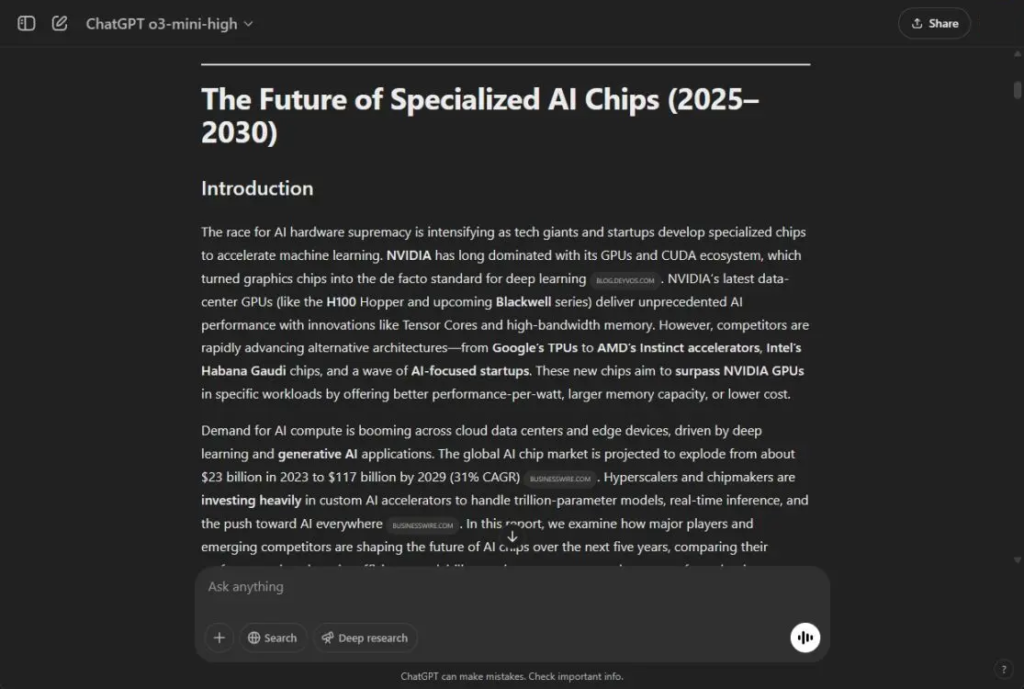
Both Deep Research agents highlighted the growing relevance of TPUs, ASICs, FPGAs, LPUs, and WSEs, along with Nvidia’s stronghold through its CUDA ecosystem. They also covered emerging silicon startups such as Groq, Cerebras, SambaNova, and Graphcore. One notable difference was that ChatGPT’s agent mentioned Huawei’s Ascend AI chip, an important detail that Gemini’s agent overlooked.
ChatGPT’s Deep Research agent also included details on Amazon’s Trainium and Inferentia chips, Microsoft’s MAIA chip, Intel’s Gaudi accelerator, and Google’s TPU. However, just like in the previous task, it struggled with up-to-date information. For instance, it failed to mention that Google has already released the TPU v6e (Trillium) chip. It also incorrectly referred to Nvidia’s Blackwell B200 as an upcoming GPU, even though it was officially released in 2024.
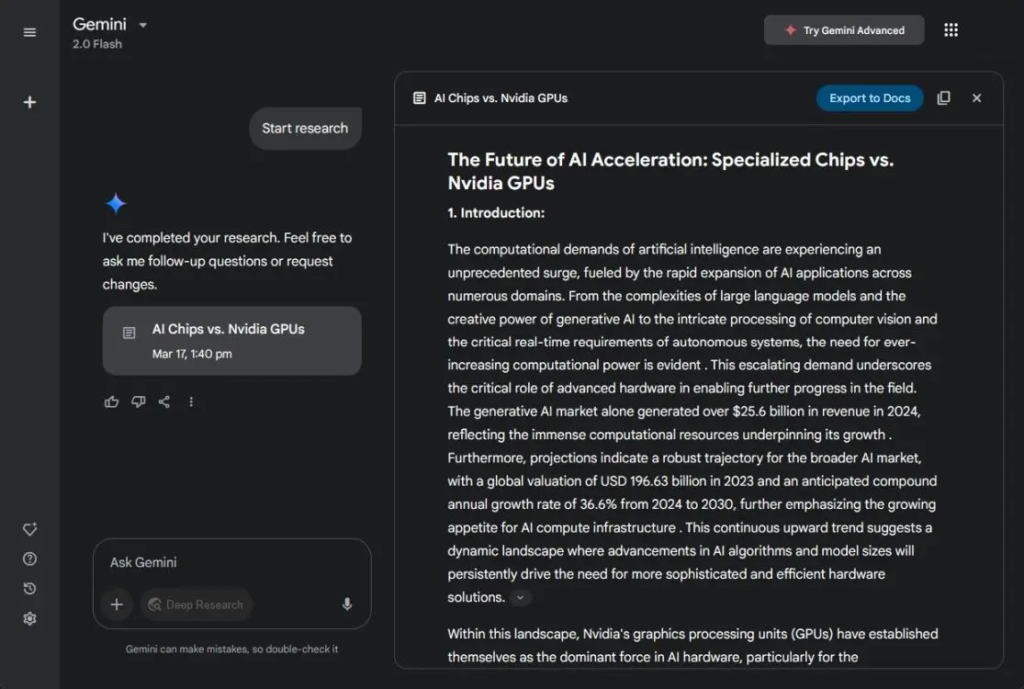
Despite its shortcomings, I’d still give the edge to ChatGPT’s Deep Research agent for this task, as its report offered more depth and valuable insights compared to Gemini. That said, there’s a fundamental issue with how ChatGPT’s Deep Research agent operates that needs to be acknowledged.
The agent runs on a fine-tuned version of OpenAI’s o3 model, which has a training cut-off date of October 2023. Because of this, the model lacks built-in knowledge of recent developments. And while it does use the internet to fetch current information, it frequently overlooks or misses the latest advancements, which affects the overall accuracy and relevance of its output.
Task #3: Research on Obesity Management in 2025
In the third task, I asked both ChatGPT and Gemini’s Deep Research agents to explore obesity management in 2025, specifically requesting coverage of the latest advancements across all types of therapies. ChatGPT’s Deep Research agent responded with a comprehensive report, citing high-quality sources and reputable medical journals to detail the current landscape of obesity treatments.
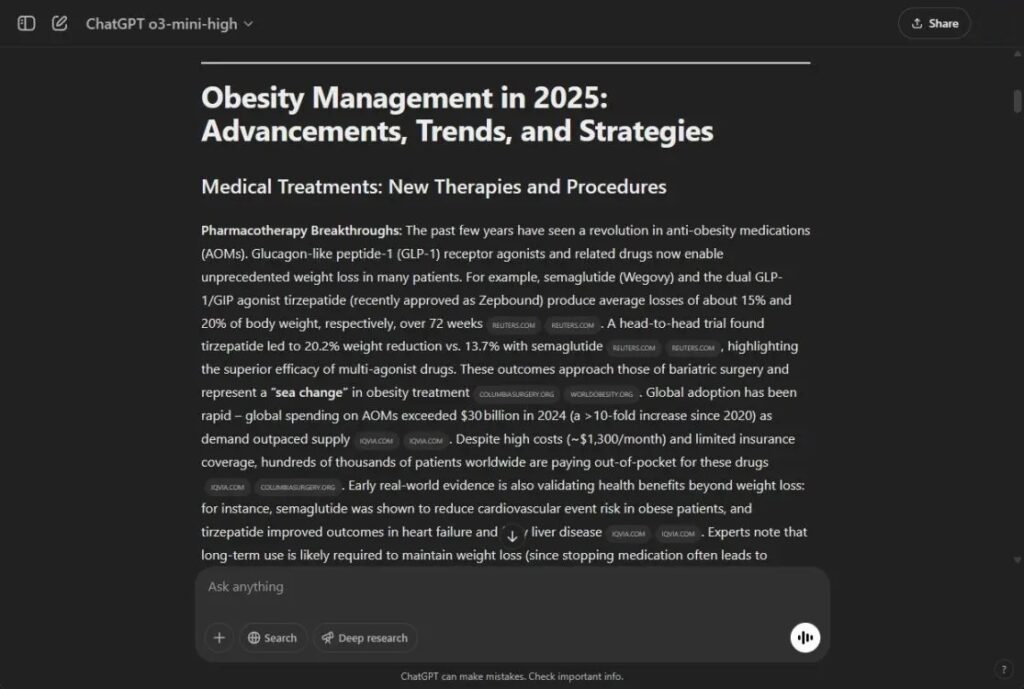
ChatGPT’s Deep Research agent highlighted recent breakthroughs such as GLP-1 peptides, discussed their side effects, detailed FDA approvals for newer drugs, and even touched on emerging gene therapy approaches. It also provided a well-rounded overview of current obesity management policies in the US, UK, and Canada.
On the other hand, Gemini’s Deep Research agent performed impressively as well. It outlined all major medical interventions and presented upcoming drug trials in a clear tabular format. What stood out was Gemini’s inclusion of cutting-edge treatments like Retatrutide, a triple hormone receptor agonist gaining attention in the medical community for its remarkable impact on weight loss.
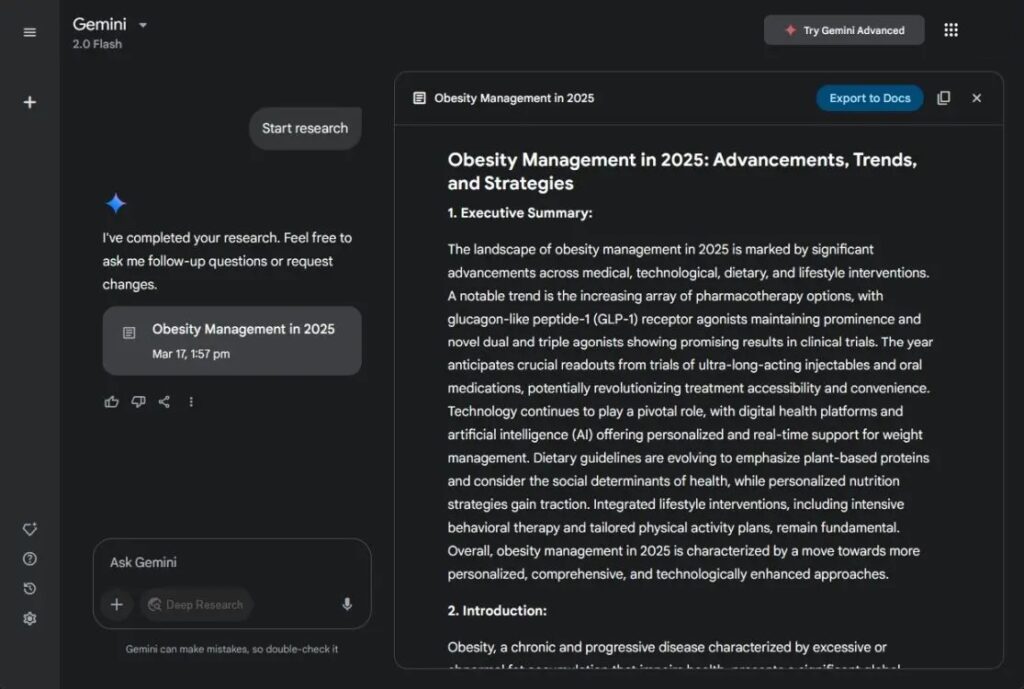
In addition, Google’s Gemini delved into pharmaceutical giants like Novo Nordisk and Eli Lilly, both of which are actively researching and developing novel drugs for weight reduction. This added valuable context and painted a more complete picture of the ongoing developments in the field. All in all, I’d say Gemini’s report was well-structured and packed with up-to-date information on obesity management.
ChatGPT Deep Research vs. Gemini Deep Research: Which One Should You Choose?
In my testing, I leaned toward Gemini’s Deep Research AI agent because it consistently provided up-to-date information across a range of topics. While ChatGPT’s Deep Research agent offers broader coverage and detailed insights, its limited awareness of recent developments prevents it from delivering a complete picture. Additionally, Gemini’s Deep Research agent is available for free, whereas OpenAI charges $20 to access its version.
Gemini’s noticeable improvement can be credited to its new Gemini 2.0 Flash Thinking model. Unlike the earlier Gemini 1.5 Pro, this updated reasoning model is designed to actively think and plan the information it needs to conduct more effective research.
That said, one major advantage of ChatGPT’s Deep Research agent is its ability to handle file uploads, a feature that Gemini currently lacks. This functionality is especially useful for STEM-related research where you may need to upload PDFs of paywalled scientific journals. Since many of these documents aren’t accessible via standard web search, uploading them directly provides a more comprehensive knowledge base for the agent to work from.
On the flip side, Gemini allows you to export its generated report directly to Google Docs, which makes sharing and collaboration much easier.
Overall, I’d recommend trying out Gemini’s Deep Research AI agent first before committing to a ChatGPT Plus subscription. Google has made notable improvements—it’s faster, more accurate with current information, and best of all, it’s free.
